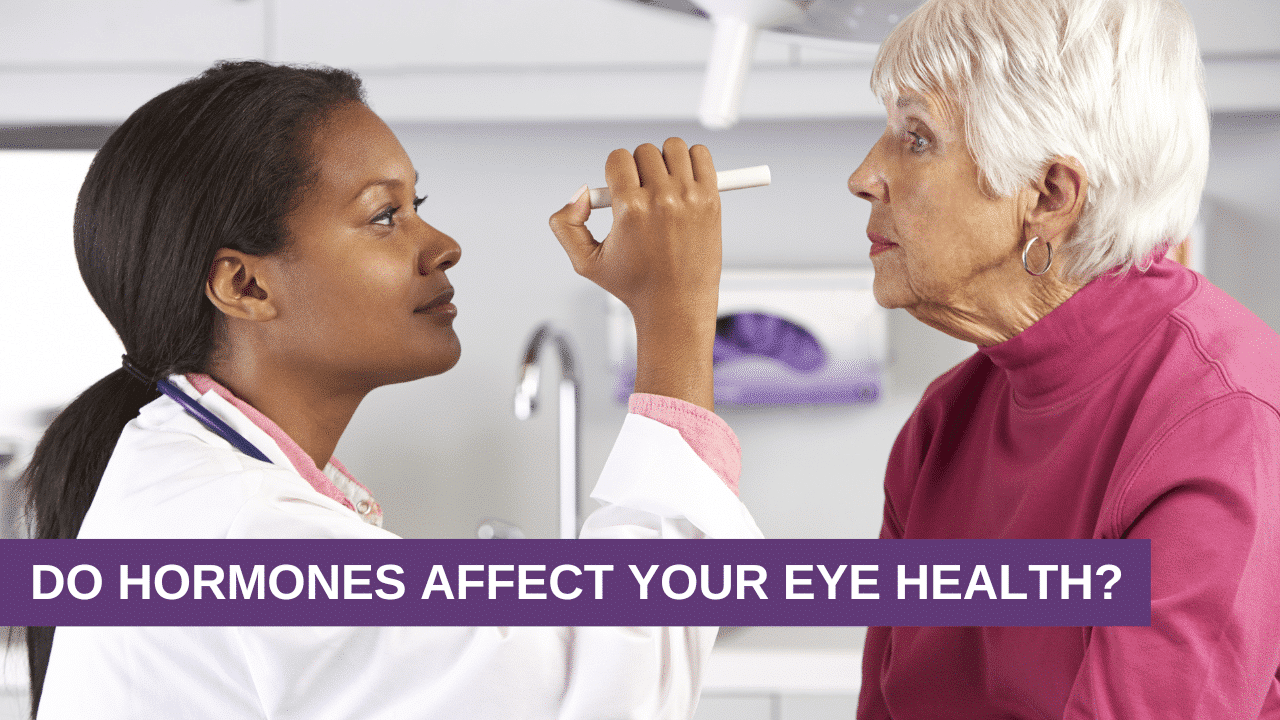Do hormones affect your eye health? Absolutely. Let’s talk about it.
As you age and your hormones decline and your vision changes.
That’s because the shape of your eyeball changes and the lens of your eye thickens causing you to need reading glasses.
Your retina, which is the back portion of your eye that integrates visual stimulus that allows you to be able to see, is affected by your sex hormones. The lens is at the front of your eye and is affected by UV light exposure. Between the retina and the lens is the vitreous body. The vitreous body is a sac filled with a gel that allows your eye to maintain its shape. The vitreous gel sac is attached all the way around inside of the globe of the eye.
I recently became interested in hormones and eye health when I had a disturbance in my vision.
I’ve been fortunate that even at the age of 61, I have not needed reading glasses partially because I’m slightly nearsighted using distant glasses for concerts and nighttime driving. I’ve also been taking Genesis Gold® for nearly 20 years, which has helped to preserve my vision. But recently I was at the beach, it was foggy so I did not wear sunglasses. Afterward, I felt some eye irritation, which I thought was from too much sun exposure. Then I noticed some dark floaters in my right eye which went away after a couple of hours. But later that evening, when the lights were off, I was seeing flashes of light on the edge of my vision.
Although my vision wasn’t affected, I immediately made an appointment with an ophthalmologist to have photographs taken of my eye. Being postmenopausal, my eyes are changing and I wanted to be sure that I had not suffered a retinal tear.
Retinal tears can lead to blindness and it is incredibly important that you get it taken care of as soon as possible.
Fortunately, I did not have a retinal tear but I did have a posterior vitreous detachment. The vitreous sac pulled away from the back of my eye which caused the floaters and flashes of light.
Posterior vitreous detachment is very common in people over the age of 45, more commonly happening in the fifth decade. The prevalence increases each decade of life -87% of 90 years old have had posterior vitreous detachments in both eyes. Within a year of having one posterior vitreous detachment, the other eye will be affected.
My ophthalmologist did not know hormones may be involved. Collagen that makes up the vitreous gel body weakens as we get older. And collagen synthesis is controlled by sex hormones, particularly estrogen. Just as your skin gets loose, so does the vitreous gel due to poor collagen production. Poor collagen production is also why your eyes start to change shape leading to reading glasses.
Keeping your hormones in balance is important.
If you experience new darkly pigmented floaters and flashes of light at the edge of your vision then drink red wine. Studies show that resveratrol, the active ingredient in red wine, can actually help to decrease the inflammation and prevent further damage. Resveratrol will not cure a posterior vitreous detachment, but it may help prevent a retinal tear.
So the first thing I did after experiencing signs of posterior vitreous detachment is to drink red wine and get some resveratrol to lower inflammation and prevent further damage.
If you have any questions about hormones and eye health, please join me in our Hormone Support Group where I answer your questions live. You can access it by signing up for my free Hormone Reboot Training.
References:
Risk factors for posterior vitreous detachment: a case-control study
Jean Y Chuo 1 , Tracy Y Y Lee, Hussein Hollands, Andrew H Morris, Romina C Reyes, Jonathan D Rossiter, Sarah P Meredith, David A L Maberley
* PMID: 17157578 DOI: 10.1016/j.ajo.2006.08.002



0 Comments